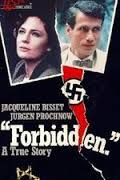
FORBIDDEN
US/UK, 1984, 114 minutes, Colour.
Jacqueline Bisset, Jurgen Prochnow, Irene Worth, Peter Vaughan, Avis Bunnage.
Directed by Anthony Page.
Forbidden is based on Leonard Glass's ‘The Last Jews in Berlin'. It highlights two characters at the outbreak of World War Two: Countess Nina von Halder, played by Jacqueline Bissett, a veterinary student who falls in love with a writer-poet, Fritz Friedlander, played by Jurgen Prochnow. She is now critical of Hitler and the Nazis. He is a well-to-do Jewish German who has chosen not to leave Berlin. The film is reminiscent of the romances of yesteryear. While documentary and news footage is inserted, the action is people-centred, the ordinary lives of people in Berlin (much as we are used to seeing films about ordinary people during the war years in London. The film works on an emotional level, the sensitive treatment of the love of Nina and Fritz, the activity of the Underground helping Jews, the continual tension with Gestapo agents and Jew-catchers. Filmed on location in Germany, the supporting cast includes Irene Worth and Peter Vaughan.
1.A strong drama? For the television audience? For an 80s audience? Now? The value of going back into the World War Two past? Jewish-German? issues?
2.The German and Berlin settings, the re-creation of period, detail and atmosphere? The use of newsreel – and moving into colour? The audience being immersed in Berlin and its way of life? The Tangerine Dream score?
3.The title, provocative, as regards the presence of the Jews in Germany, the attitude of the Gestapo and the Nazis, of the law? Moral issues? The book and the last Jews?
4.The introduction to Germany, Hitler and his achievement, the waging of the war, the presentation of the war in the media? Questions? The Gestapo and its ability to spy? Gathering information, passing it on to authorities? The Jews, the people setting out to catch Jews? Youth and the bashings? The Gestapo searches, even continuing as defeat was looming?
5.The Jews in Germany, their status in 1938, persecution, people leaving? Those deciding to stay? Ruth and her husband? The judge, Berlin, the French magazine? The growing violence? The Swedish and their helping, the underground? Hiding Jews, the techniques? Those caught? The Jew-catchers? Max and his being sentenced to forced labour? The jokes, the drinking? The religious aspects? Death, song – and wanting to save people?
6.Jacqueline Bisset as Nina, her background, way of life, studies?
7.Fritz, the fruit, the party, the meeting, the affair, Ruth, the villa, danger? Pregnancy and hiding? His farewell? The rules – the sofa, oppression, exercise? Bertha? The farewell to the mother? Hospital – and the coffin? Growing tension, secrets, clashes? The day out and the catcher? The train, staying, the failure to find him in the sofa? Death? The religious dimension?
8.Ruth, her style? Bertha, the reasons, the decisions, farewell and death?
9.The picture of the SS, the Gestapo personalities, the interviews and the nature of the interviews? The searches?
10.Erika, the arrest, homosexuality? Father, in hospital?
11.Mrs Schmidt, the cleaning, snooping?
12.The church and the underground, the help from the Swedish, hiding the Jews? The influence of Dietrich Bonhoffer?
13.The Russians, their motivations, behaviour?
14.Nina, the war years, her helping the Jews, her cover, her own personal life, relationships? The effect of this experience on her?